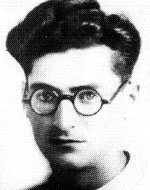Averbuch, Meir
Son of Yitzhak. Shortly after World War I broke out, his mother died and he moved to his grandfather’s home, an educated Jew and an amateur of Zion, who also educated the boy in this spirit, where he met Meir For the first time in the books of Abraham Mapu, Karl May, the Bible fell in love with them. Later on, he went to the village to prepare himself for farming in one of the first kibbutzim established in Warsaw. In the He – Chaluts movement, which joined its ranks, he showed great activity and adherence to the ideas underlying it. “I can not be a socialist like I can not be a Jew,” he said. For a while he worked in a glass factory and later served in the Polish army. In 1929 he immigrated to Eretz Israel, where he worked first at Kibbutz Givat Hashlosha and a year later became an agricultural laborer in Petah Tikva and stood out diligently and devotedly to work. Because of poor nutrition, he became dysentery, became very weak and was forced to leave his job. After lengthy efforts, he found work as a foreman and as a mechanic in Pardes Ramat Gan. From the beginning of his career in Israel he was a member of the Haganah and active in it, studied signaling and specialized in it. This study was implemented in Gan Yavne, which moved to it in 1934, where he worked first as a laborer in orchards and later as a mechanic and a plumber. During the bloody riots of 1936-1939, he devoted days and nights to defense matters, taught and instructed at a signal, and also passed defensive positions while neglecting his private affairs. His friends from that period described him as a thin, tall man, his face Yaffa and delicate, his eyes strong and strong, and full of energy and initiative, honest and sensitive to wrongdoings. On October 18, 1938, Meir traveled with Avraham Cohen, his friend and friend to protect the settlement, from Tel Aviv to Gan Yavneh. Between Pardes and Arburg and Dagon police, the two of them were shot by an Arab gang on the bus. Meir died on the spot while Abraham shortly after. The two were brought to rest in a mass grave in Gan Yavneh. Meir put down a wife. The children of the colony wrote things in their memory and a pair of twins born shortly after their fall were named after them: Meir and Avraham. The workers’ neighborhood was named after them in Gan Yavneh: Ramat Hashaniim, and their friends from the moshavah took out a booklet entitled “The Two” on their first anniversary.
